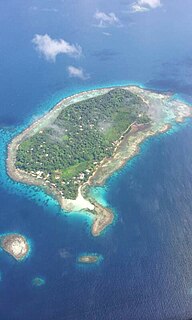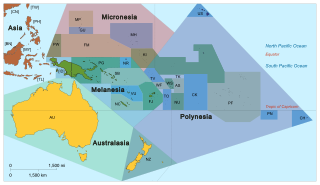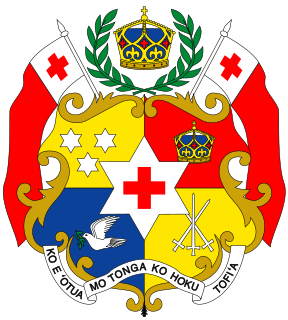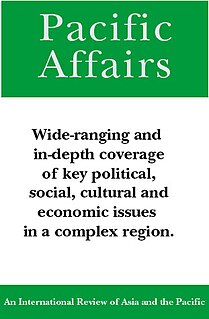
Micronesia is a subregion of Oceania, composed of thousands of small islands in the western Pacific Ocean. It has a shared cultural history with two other island regions: Polynesia to the east and Melanesia to the south.

The foreign relations of the People's Republic of China (PRC), commonly known to most states as China, guides the way in which China interacts with foreign nations and expresses its political, economic and cultural strengths, weaknesses and values. As a great power and emerging superpower, China's foreign policy and strategic thinking are highly influential China officially claims it "unswervingly pursues an independent foreign policy of peace. The fundamental goals of this policy are to preserve China's independence, sovereignty and territorial integrity, create a favorable international environment for China's reform and opening up and modernization of construction, and to maintain world peace and propel common development." An example of a foreign policy decision guided by "sovereignty and territorial integrity" is its not engaging in diplomatic relations with any country that recognizes the Republic of China (Taiwan), which the PRC does not recognise as a separate nation. China is a member of many international organizations, holding key positions such as a permanent membership on the United Nations Security Council. The PRC's diplomatic goals were expansionist for achieving international communist revolution before the Cultural Revolution ended. In the early 1970s, the PRC replaced the ROC as the recognised government of "China" in the UN following Resolution 2758. As a nuclear power, China signed the Treaty on the Non-Proliferation of Nuclear Weapons in the United Nations. China's foreign policy today is summarized as strategic relations with neighboring countries and the world's superpowers to strive for China's national interest, and to create a favorable environment for China's domestic development for perpetual competition in the world in the long-run.

Pacific Islanders or Pasifikas are the peoples of the Pacific Islands. It is a geographic and often ethnic/racial term to describe the inhabitants of any of the three major sub-regions of Oceania: Micronesia, Melanesia and Polynesia. These people speak various Austronesian languages.

The Indo-Pacific, sometimes known as the Indo-West Pacific or Indo-Pacific Asia, is a biogeographic region of Earth's seas, comprising the tropical waters of the Indian Ocean, the western and central Pacific Ocean, and the seas connecting the two in the general area of Indonesia. It does not include the temperate and polar regions of the Indian and Pacific oceans, nor the Tropical Eastern Pacific, along the Pacific coast of the Americas, which is also a distinct marine realm.

Tonga, by a modification of its treaty of friendship with the United Kingdom in July 1970, is responsible for its own external affairs. It maintains cordial relations with most countries and has close relations with its Pacific neighbours and the United Kingdom. In 1998, it recognized the People's Republic of China and broke relations with Taiwan.

Terms such as Northeast Asia, North East Asia, or Northeastern Asia refer to a subregion of Asia: the northeastern landmass and islands, bordering the Pacific Ocean. It includes the core countries of East Asia.
FleishmanHillard Inc. is a public relations and marketing agency founded and based in St. Louis, Missouri. It was acquired by Omnicom Group in 1997, becoming part of the Diversified Agency Services (DAS) division. The company was founded in 1946 by Alfred Fleishman and Bob Hillard.
The Institute of Pacific Relations (IPR) was an international NGO established in 1925 to provide a forum for discussion of problems and relations between nations of the Pacific Rim. The International Secretariat, the center of most IPR activity over the years, consisted of professional staff members who recommended policy to the Pacific Council and administered the international program. The various national councils were responsible for national, regional and local programming. Most participants were elite members of the business and academic communities in their respective countries. Funding came largely from businesses and philanthropies, especially the Rockefeller Foundation. IPR international headquarters were in Honolulu until the early 1930s when they were moved to New York and the American Council emerged as the dominant national council.

The Philippines' Department of Foreign Affairs is the executive department of the Philippine government tasked to contribute to the enhancement of national security and the protection of the territorial integrity and national sovereignty, to participate in the national endeavor of sustaining development and enhancing the Philippines' competitive edge, to protect the rights and promote the welfare of Filipinos overseas and to mobilize them as partners in national development, to project a positive image of the Philippines, and to increase international understanding of Philippine culture for mutually-beneficial relations with other countries.
The Pacific Basin Economic Council (PBEC) is an influential independent business association founded by Weldon B. Gibson in 1967 with the objective of facilitating business in the Asia-Pacific region. It is currently located in Hong Kong and the Chief Executive is Deborah Biber.
Asian Canadians are Canadians who can trace their ancestry back to the continent of Asia or Asian people. Canadians with Asian ancestry comprise the largest and fastest growing visible minority group in Canada, with roughly 17.7% of the Canadian population. Most Asian Canadians are concentrated in the urban areas of Southern Ontario, the Greater Vancouver area, Calgary, and other large Canadian cities.

India's Look East policy is an effort to cultivate extensive economic and strategic relations with the nations of Southeast Asia in order to bolster its standing as a regional power and a counterweight to the strategic influence of the People's Republic of China. Initiated in 1991, it marked a strategic shift in India’s perspective of the world. It was developed and enacted during the government of Prime Minister Narsimha Rao (1991–1996) and rigorously pursued by the successive administrations of Atal Bihari Vajpayee (1998–2004) and Manmohan Singh (2004–2014). Currently Prime minister Narendra Modi is taking policy to next level as Act East Policy.

The Asian Relations Conference took place in New Delhi in March-April 1947. It was hosted by Prime Minister Jawaharlal Nehru, who then headed a provisional government that was preparing for India's Independence, which came on 15 August 1947. The Asian Relations Conference brought together many leaders of the independence movements in Asia, and represented a first attempt to assert Asian unity. The objectives of the conference were "to bring together the leading men and women of Asia on a common platform to study the problems of common concern to the people of the continent, to focus attention on social, economic and cultural problems of the different countries of Asia, and to foster mutual contact and understanding."

Pacific Affairs(PA) is a Canadian peer-reviewed scholarly journal that publishes academic research on contemporary political, economic, and social issues in Asia and the Pacific. The journal was founded in 1926 as the newsletter for the entirety of the Institute of Pacific Relations (IPR). In May 1928, PA adopted its current name, and has been published continuously since. From 1934 to 1942, the journal was edited by Owen Lattimore, the pioneering scholar of Central Asian history, then William L. Holland.
Canada-Asia Relations are relations between Canada and Asian countries. These include bilateral relations between Canada and individual Asian states and multilateral relations through groups such as Asia-Pacific Economic Cooperation.

The Afghan Public Protection Force (APPF) is a Government of the Islamic Republic of Afghanistan (GIRoA) security service provider intended to protect people, infrastructure, facilities and construction projects. The APPF is organized as a State Owned Enterprise (SOE) subordinate to GIRoA's Ministry of the Interior (MOI) and is designed to contract with both domestic and international customers for security services within Afghanistan. Between 20 March 2012 and 20 March 2013, the APPF will replace all non-diplomatic Private Security Companies (PSCs) in Afghanistan as the sole provider of pay-for-service security requirements. APPF guards have no mandate to investigate crimes or arrest suspects.

Victor Oh is a Canadian senator from Ontario. He was appointed to the Senate on January 25, 2013.
Peter G. Waieng was a Papua New Guinea politician. Waieng served as a member of the National Parliament of Papua New Guinea, representing the Kundiawa-Gembogl constituency, from 1997 to 2002. Waieng also served as the Minister of Defence within the Prime Minister's cabinet as a member of parliament.













